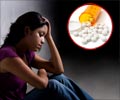
Researchers claimed that the new findings would help many individuals for whom anti-depressants give little or no relief.
According to them, a third of depressed patients receive little or no benefit from taking anti-depressants, even after they used these along with psychological counselling and of those who respond to treatment, symptoms such as fatigue and trouble in sleeping pose risk factors for relapse.
The study has claimed that those supplementing anti-depressants with Modafinil would stood to benefit.
Cynthia Fu, a professor in the University of East London, who undertook the research at the King's College London described it as good news for individuals struggling to fight depression.
"Depression affects all aspects of life, leading to occupational and social disability at varying levels. It is particularly important that people receive effective treatment as the residual symptoms e.g., fatigue, lack of concentration etc. can persist and have a negative impact on their lives," Fu said.
Advertisement
The survey involved a total of 568 patients with unipolar depression, and a total of 342 patients with bipolar depression.
Advertisement
Modafinil also showed good effects on fatigue and sleepiness with added benefit of the comparable side effects of placebo.
A placebo is a medically ineffectual treatment for a disease or other medical condition intended to deceive the recipient.
Depression is a major global health problem across the world.
According to the World Health Organisation, it is estimated to be the second leading cause of disability worldwide by 2020.
Source-IANS















